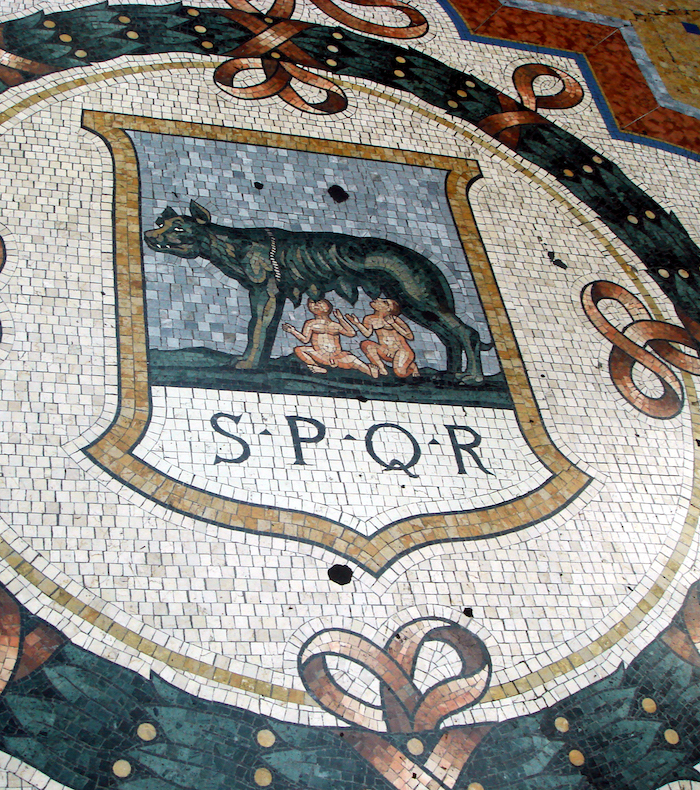How often do we think of the Roman empire?

Last week or the week before, a meme went around claiming that women don’t realise how often men think of the Roman empire, which must be at least once a day, and various people examined how often they thought of it. The Roman empire stretched at its peak across three continents, and its legacy is viewed differently in the different countries it occupied. What do these men think of, who think of the Roman empire any number of times a day?
If you have any interest in European history, or European languages, its legacy is all around. Britain has cities that were founded by them, and roads built by them that are still in use today, sometimes as major roads; we all did history at school until the middle of secondary school and we will often have visited museums and maybe even ruins (I certainly visited a lot of Roman ruins on holidays to Mediterranean destinations as a child). I grew up in the suburbs of London and when we did a London history project at school, we visited the Museum of London and the Roman period of London’s history loomed large, even though there isn’t much left of Roman London, or Londinium, except parts of the wall. We really learned nothing of British history between the Romans’ departure and the Tudor era, except for a brief mention of the Norman conquest in 1066; the country was portrayed as having fallen into ruin after the Romans left, with one Saxon king having written a letter to the Romans begging them to come back, but to no avail.
The Romans’ impact on European languages is inescapable. Four of the five major Latin-based languages exist because of it; the Roman Empire is the reason Latin-based languages are spoken anywhere except Italy. Whether because of the empire itself or because of its later use in Christian liturgy (and in no small part in the case of English because of the Normans, who gave England a French-speaking ruling class), Latin (along with Greek, which was the major language in much of the empire and a lingua franca even in Italy then) permeates languages that are not Latin-based, including English and German, and make up the bulk of scholarly, scientific and technical vocabulary in those languages. It was, of course, later colonial empires, those of Britain, France, Spain and Portugal, which spread that influence to much of the rest of the world (hence why so many languages today are written with a modernised Latin alphabet), but none of that would have been possible without the influence of the Roman Empire.
When the Romans made most of their conquests they were polytheists, with some emperors believing or insisting people believe they were gods; later, the Roman Empire became Christian and the Eastern Roman Empire was the standard-bearer of Eastern Orthodoxy until Constantinople (now Istanbul) was conquered by the Turkish Muslims, while in the west German kings styled themselves Holy Roman Emperors, a tradition dating back to the 9th century when the Pope crowned Charlemagne as Roman emperor, which no Roman pope had done for 300 years, until the 19th century when Germany fell to Napoleon’s France and the ruling Hapsburg family were removed to Vienna. Catholics continued to use Latin for their liturgy and their spoken Mass until the 1960s and the Latin Mass was reintroduced under Pope Benedict. The official language of the empire in the east always was Greek, and despite retaining the ‘Roman’ name, the empire once it had lost the western territories we associate with it here in the UK was a Greek-speaking entity. The influence was such that a pre-Ottoman Muslim state in Anatolia (today the Asian part of Turkey) was called the Sultanate of Rum, or Rome. Christianity as we know it, despite the religion’s Judaic origin, was formed by the Roman and Greek church fathers and for centuries its languages were Latin and Greek, not its original Aramaic. The majority of Christians have names that, although sometimes of Hebrew origin, are filtered through Latin and Greek. And where do we get the names Africa and Asia? They were the names of Roman provinces, one in today’s Algeria and one in western Anatolia. They were the parts of those land-masses closest to Europe, in other words.
And then there’s the influence on literature, on philosophy, on politics. The notion of the representative assembly as we know it traces back to the Roman senate; the empire was originally called the Roman Republic, and its citizens were divided into patricians and the plebs (which is singular; individuals are plebeians), both terms still in use today. (Democracy came from Greece, and as originally conceived meant direct democracy, although women and slaves were excluded.) Roman works on politics and philosophy, as well as epics such as Virgil’s Aeneid, are still studied today; Rome has been the setting for more recent works of literature and theatre from Shakespeare’s Julius Caesar to Robert Graves’s I, Claudius to films such as Spartacus. And any Christian will be aware of the setting for the mission of Jesus Christ: the Roman occupation of the land of Judaea or Palestine, and the role of the Roman procurator, Pontius Pilate.
So, much as we may have no interest in Roman gods or military regalia, the legacy of Rome is all around us, in our history, our language, our names, our literature, and anyone not living under a rock will be reminded of it once in a while.
Image source: G.Dallorto via Wikimedia.

